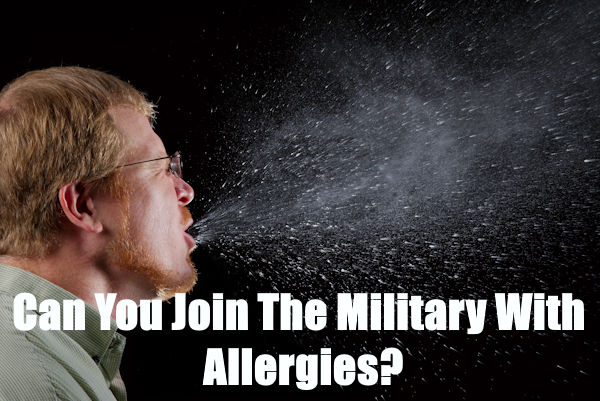Can you join the military with allergies?
The U.S. Armed Forces consider many different health factors during enlistment that may impact service.
As a result, some medical conditions may disqualify you for military service, while others will not.
Learn more about common allergies and how they correlate to military service, below.
Related Article – 20 Health Conditions That May Not Allow You To Join The Military
Table of Contents
Can You Join The Military With Allergies?

There are many steps to joining the U.S. military.
First, recruits who are interested in the Armed Forces must complete a series of background investigations.
These include comprehensive medical and psychological examinations designed to examine the overall health of the service member.
For this reason, the U.S. Armed Forces examine new recruits at Military Entrance Processing Stations (MEPS) before enlistment.
New recruits are asked to complete a questionnaire that lists off a series of health conditions, including allergies.
As a result, the U.S. Armed Forces will ask if you have any of the following:
- Food Allergies
- Drug Allergies
- Insect Allergies
- Pet Allergies
Can you join the military with common allergies?
In general, it depends on the type of allergy along with the severity of the medical condition.
The military does grant waivers to recruits who have a preexisting condition and can demonstrate that the condition does not impact their perfomance.
Regardless, new recruits must arrive in outstanding physical shape in order to survive basic training and have a rewarding military career.
Learn more about each type of allergic condition and how it may affect military service, below.
Related Article – Can You Join The Military With Autism?
Food Allergies

Food allergies affect 1 in 13 children and can remain problematic into adulthood.
Sadly, food allergies are becoming more prevalent in the United States and can even impact military service.
It may seem trivial, but the Armed Forces do disqualify recruits with severe enough food allergies.
The problem with military service is that personnel is often deployed for months, generally in remote or exotic foreign locations.
As a result, it’s not always easy to accommodate service members that require a specific diet.
Furthermore, military deployments are often far from quality medical care in the event of a severe reaction.
Consequently, those with a history of food allergies may be disqualified for military service.
However, the determination is made on a case-by-case basis and really depends on severity.
For example, those who are only sensitive to certain types of food will not be disqualified.
Be that as it may, the definition of “allergy” is not universal among the service branches.
Whereas the United States Army defines allergies as:
“A reliable history of a moderate to severe reaction to common foods, spices, or food additives”
The other military branches are more specific, defining disqualifying allergies as those with reactions that include anaphylaxis.
Accordingly, severe reactions to the following food allergies may be grounds for disqualification:
- Peanut allergies
- Fish allergies
- Shellfish allergies
- Milk allergies
- Gluten allergies
Nevertheless, recruits always have the freedom to request a medical waiver.
Waivers for food allergies may be granted after the recruit speaks with a physician or allergist.
Often, the allergist will seek to complete an oral food challenge to determine if the recruit is suitable for service.
Finally, the military also has a protocol for personnel who develop food allergies while already in service.
These evaluations are usually completed on a case-by-case basis to determine eligibility.
Disqualifying Food Allergies
In general, the U.S. Armed Forces is particular about certain types of food allergies.
These include allergies to common, everyday foods like milk, bread, eggs, meat, or fish.
Moreover, disqualifying food allergies can also include severe reactions to certain ingredients, like gluten.
These include disorders like celiac disease, which is another disqualifying health factor in the U.S. Armed Forces.
Additionally, those who are currently prescribed allergy shots are also likely to be disqualified.
The main issue with service members who have allergies to common foods is that it’s hard to make special accommodations, especially overseas.
Consequently, those who are deployed for months on end have trouble keeping up with an allergy shot regimen or special diet.
Related Article – Can You Join The Military If You’re Colorblind? For Some Jobs, Yes
Drug Allergies

Can you join the military with drug allergies?
In general, drug allergies are defined as an adverse reaction to a medication.
These allergic reactions can cause serious side effects and discomfort.
Fortunately, the U.S. military does not bar entry to those who react poorly to a certain type of drug.
Be that as it may, new recruits are still advised to remain truthful on the MEPS questionnaire.
The health questionnaire is designed to gain a better understanding of your overall health and abilities.
As such, if you have ever witnessed any extreme or severe reactions to a medication, make sure to make note of it.
It’s especially crucial if you’ve had a negative reaction to pain medication or other types of treatment that may be applied during service.
Generally, the U.S. Armed Forces do not disqualify recruits who have negative reactions to drugs and prescription medications.
Rather, the military branch is seeking to know if there are any types of drugs or medications they should avoid giving you.
Furthermore, a drug allergy is different from having an intolerance to a substance.
Those with a drug intolerance may suffer mild side effects or discomfort but usually avoid severe reactions.
Often, the U.S. military grants medical waivers so long as:
- The allergic reaction has not remerged since childhood.
- Allergic reaction leads to mild or moderate symptoms.
- The service member has never been prescribed allergy shots.
It’s crucial to answer the MEPS health questionnaire truthfully.
These questions help the U.S. Armed Forces get a better understanding of your health predicament.
Reactions to Chemicals & Substances
It’s also possible to experience a poor reaction from touching materials or substances.
For example, some people are allergic to wool, which may influence military enlistment.
Additionally, contact dermatitis produces an uncomfortable rash after touching certain types of soaps and plants.
Unfortunately, while operating in foreign territory, military personnel may come into contact with a wide variety of substances.
Some of these are predictable, while others are difficult to predict if you’ll experience a severe reaction until exposed to them.
Nonetheless, if you have experienced certain rashes or other side effects of an allergic reaction, it’s worth mentioning in the questionnaire.
This condition may affect military service but is generally considered on a case-by-case basis (just like the other types of allergies).
Related Article – Can You Join The Military With Flat Feet?
Insect Allergies

Insects also play a significant factor in military service.
Military personnel are often exposed to the climate and are at the mercy of the elements.
Thus, those who have a severe reaction to certain types of insects like bees and wasps may be at risk.
The military does its best to protect soldiers but there is little it can do about insect stings and bites.
Be that as it may, a severe reaction in foreign territory could trigger a series of unwanted events.
As such, the military may prevent recruits who suffer from severe reactions from joining.
The problem with allergic reactions is that they prevent otherwise fit and healthy recruits from joining military service.
Accordingly, the U.S. military does assess each case differently.
Those who suffer from intense itching or swelling after insect bites or shortness of breath are least likely to qualify.
However, medical waivers do exist, especially if the recruit can prove that they no longer need to carry an adrenaline auto-injector (AAI).
Often, those who are still required to carry an AAI are unable to serve in the military.
Technically, the U.S. Armed Forces define “a reliable history of anaphylaxis to stinging insects” as the basis for disqualification.
Related Article – Can You Join The Military With Scoliosis?
Pet Allergies

Can you join the military with pet allergies?
Pet allergies are a relatively new concept that hasn’t been precisely addressed yet by the U.S. Armed Forces.
In the past, the military has taken a very broad approach to categorizing allergies within disqualifying health conditions.
While it does specifically mention food, drug, and insect allergies, nothing is deliberately stated regarding pet allergies.
Still, like any type of allergy, if the reaction is severe enough it could jeopardize your future in the Armed Forces.
Be that as it may, pet allergies are usually not a huge cause for concern since the military does not travel with a lot of animals.
Common household pets usually stay home aside from some well-trained canines and other animals of use.
Therefore, you can usually get away with pet allergies unless you were hoping to work in K9 policing or animal care.
Related Article – Can You Join The Military With ADD/ADHD?
Conclusion
The military is challenging and demands certain physical requirements.
Many of these physical requirements make sense for military service.
However, others, like severe allergic reactions, may seem trivial. Nevertheless, certain types of allergies (food, drugs, and insects) may be grounds for disqualification.
The good news is that recruits can apply for a medical waiver regarding many of these conditions.
Featured Image Source – Wikipedia.org
- Ikon Pass Military Discount: Learn How To Save Big - January 31, 2025
- RTIC Military Discount: Find Out How To Save Big on Gear - January 30, 2025
- Traeger Military Discount: Learn How To Save Big on Smokers - January 28, 2025


